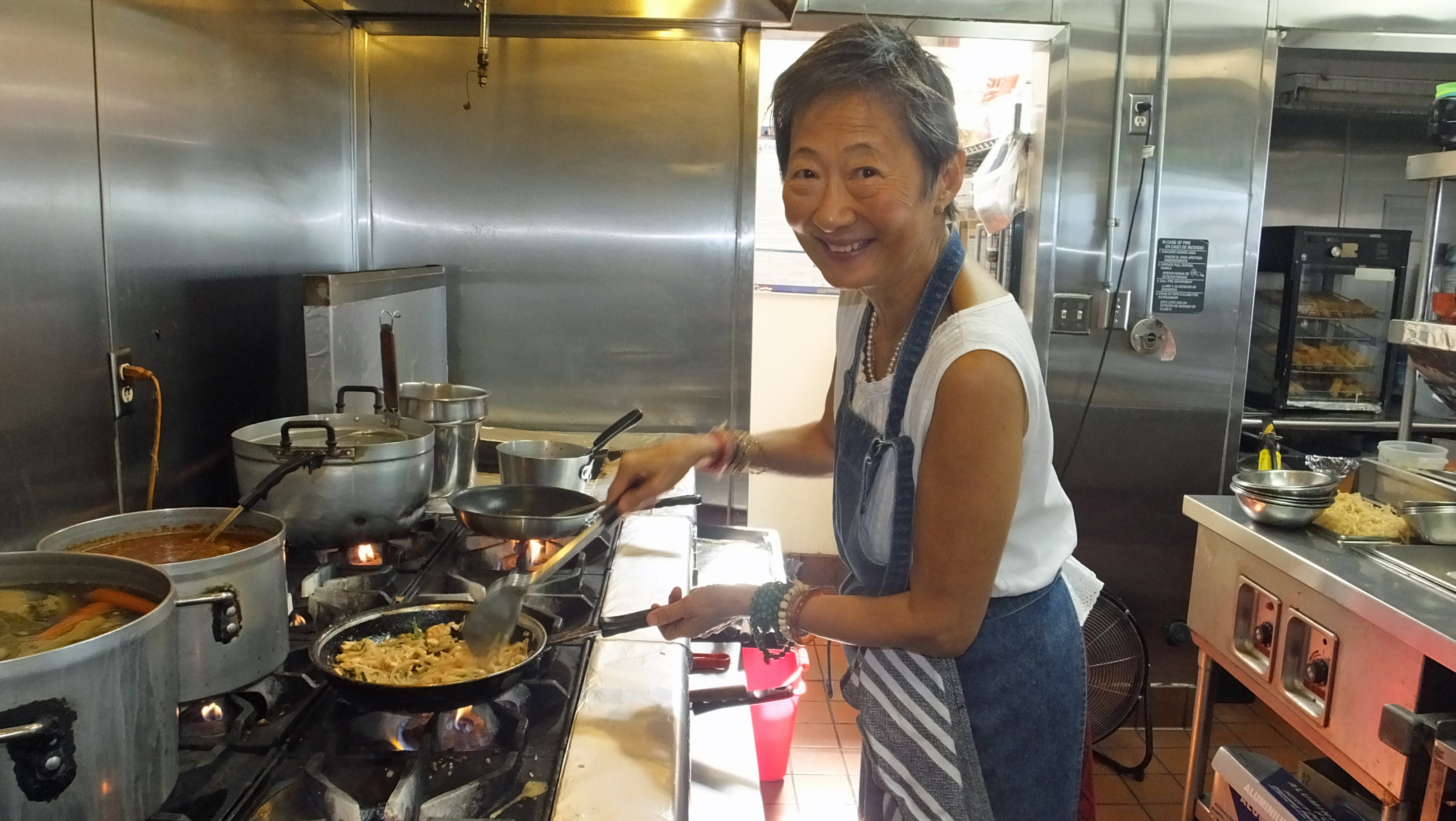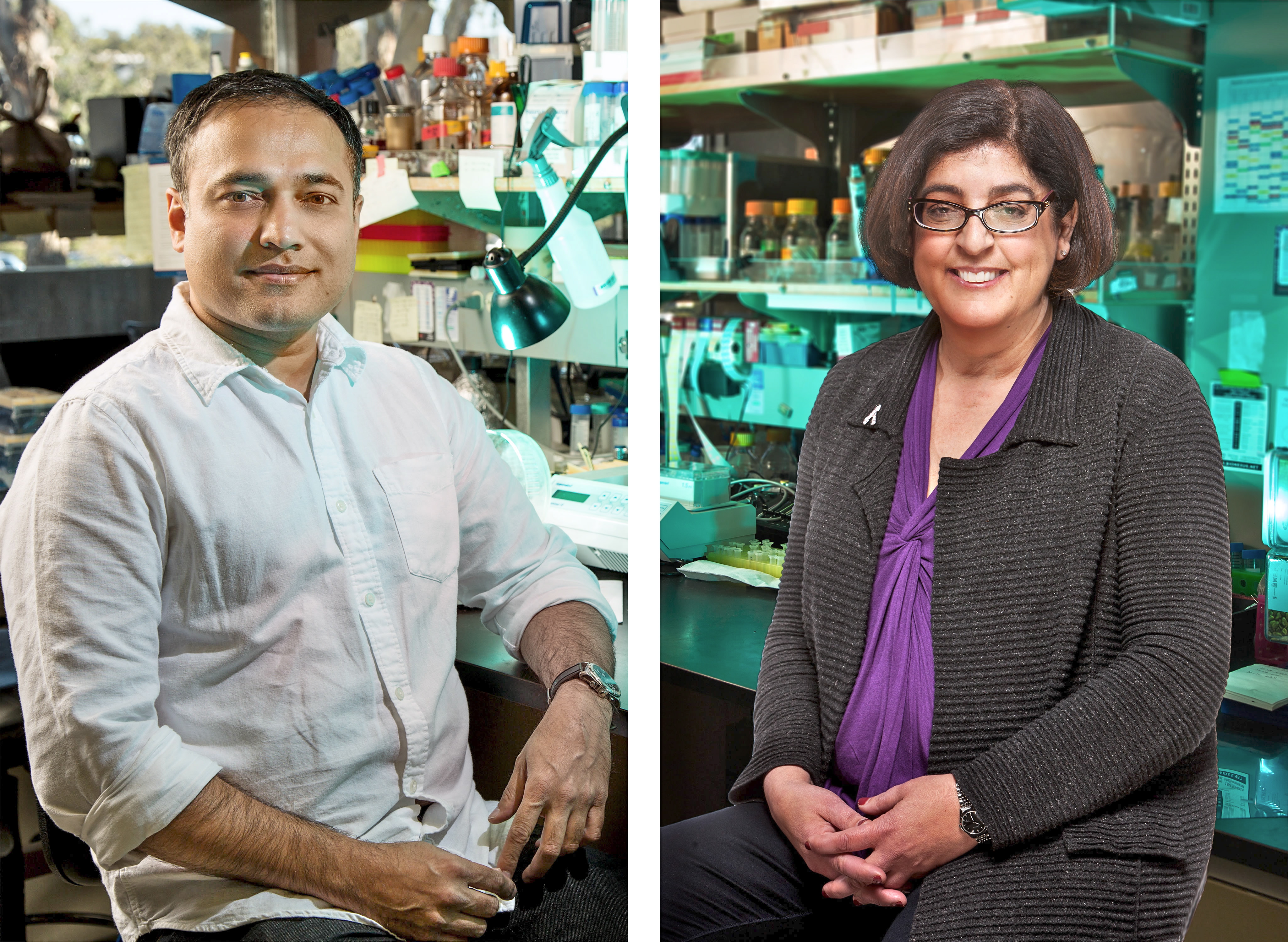Daily Business Report-Jan. 4, 2016
Salk Institute researchers Ullas Pedmale and Joanne Chory.
Cellular Sensor Helps Plants Find Light
Salk discovery of novel pathway
could be boon to agriculture
Despite seeming passive, plants wage wars with each other to outgrow and absorb sunlight. If a plant is shaded by another, it becomes cut off from essential sunlight it needs to survive.
To escape this deadly shade, plants have light sensors that can set off an internal alarm when threatened by the shade of other plants. Their sensors can detect depletion of red and blue light (wavelengths absorbed by vegetation) to distinguish between an aggressive nearby plant from a passing cloud.
Scientists at the Salk Institute have discovered a way by which plants assess the quality of shade to outgrow menacing neighbors, a finding that could be used to improve the productivity of crops. The new work, published December 24, 2015 in Cell, shows how the depletion of blue light detected by molecular sensors in plants triggers accelerated growth to overcome a competing plant.
“With this knowledge and discoveries like it, maybe you could eventually teach a plant to ignore the fact that it’s in the shade and put out a lot of biomass anyway,” says Joanne Chory, senior author and director of Salk’s Plant Molecular and Cellular Biology.
Ullas Pedmale was first author of the work and a Salk research associate.
The new work upends previously held notions in the field. It was known that plants respond to diminished red light by activating a growth hormone called auxin to outpace its neighbors. However, this is the first time researchers have shown that shade avoidance can happen through an entirely different mechanism: instead of changing the levels of auxin, a cellular sensor called cryptochrome responds to diminished blue light by turning on genes that promote cell growth.
This revelation could help researchers learn how to modify plant genes to optimize growth to, for example, coerce soy or tomato crops (which are notoriously fickle) grow more aggressively and give a greater yield even in a crowded, shady field.
________________________________________________

Su-Mei Yu
Popular restaurateur chef cooks from the heart
By Delle Willett
In Chinese culture it’s tradition that daughters of well-to-do families don’t cook. Cooking is done by servants.
However, in the Yu family, which fled from China to Thailand, misfortune trumped tradition and Su-Mei Yu’s mother, Lee Kwei Chi, cooked for her family and to support her family.
“She was a fantastic cook, gifted with the ‘tongue,’ which enabled her to identify ingredients and flavorings and duplicate the dishes she tasted,” said Su-Mei Yu, who was welcomed with her sister and brother into the kitchen to observe and learn about traditional cooking.
They watched their mother every step of the way, making noodles from scratch, killing chickens, crabs and fish, and they listened as she explained each process. But they never touched.
Lee Kwei Chi knew it was important for her children to be educated in food, because it’s tied to its culture, people and traditions.
“In addition to being an amazing cook, my mother was a fantastic storyteller. We learned so much about food and culture from her. She told us legends, stories, gossip — whether or not they were true — it was all great fun. None of our friends ever got to be in the kitchen,” said Su-Mei.
She did get some occasional hands-on experience when her mother cooked for a big feast or banquet like on the Chinese New Year.
In October 1985, when Su-Mei opened her tiny 700-square-foot restaurant on India Street in Mission Hills, Saffron Thai Grilled Chicken, she knew enough about Thai food to know that she needed to learn more.
So she rallied her friends and family in Thailand to find families who would accept her into their humble homes to learn how to cook dishes that have been passed down through the generations and that she couldn’t have learned from recipes.
Click here to get the current issue of SD METRO, where Su-Mei Yu’s story is told.

Initiative Measures that Didn’t Make it to the Ballot
Times of San Diego
We’ve been spared having to vote on seceding from the union and ending alimony. And there will be no president of California.
Great fanfare greets the announcement of state ballot drives. But most efforts die on the signature-gathering vine. In the past month alone, 10 would-be initiatives have failed or been withdrawn, including several by marijuana advocates.
According to Secretary of State Alex Padilla’s office, these measures failedin the past month to qualify for statewide ballots in 2016:
Use of Reasonable Force (initiative statute) — James T. Lawrence didn’t get the 365,880 signatures needed for a measure to suspend laws pertaining to use of force by law enforcement for 180 days. It would have required governor to “appoint 11-person panel to review suspended laws and recommend changes to prevent violence committed by law enforcement officers against people of color.”
Display of State Flag (initiative statute) — Louis J. Marinelli didn’t get needed 365,880 signatures to require the California state flag be displayed in “the position of first honor when both the United States flag and the California state flag are displayed at schools, universities, colleges, courtrooms, government buildings and state parks, and at events held in coliseums, stadiums, bowls, other open air sites, and race tracks.”
Political Contributions. Out-of-State Donors (initiative statute) — Marinelli failed to get 365,880 signatures for measure barring candidates, committees and certain political mailer organizations from receiving funds from non-California residents.
President of California (initiative constitutional amendment) — Marinelli failed to get 585,407 signatures for effort to replace the word Governor with the word President in the state Constitution.
Sexual Orientation Prejudice (initiative statute) — Charlotte Laws failed to get 585,407 signatures for a ballot measure that “provides any person who proposes a ballot measure that advocates the killing of gays and/or lesbians must attend sensitivity training and donate money to a pro-gay or pro-lesbian organization.”
Legislatute Expansion. Legislative Process (intiative constitutional amendment) — John H. Cox failed to get 585,407 signatures for a measure that would increases size of Legislature almost 100-fold by dividing current Assembly and Senate districts into neighborhood districts “such that each Assemblymember represents about 5,000 persons and each Senator represents about 10,000 persons.”
Shellfish Ban (initiative statute) — Joe Decker failed to get 365,880 signatures for a measure to makes sale or consumption of shellfish “a serious felony punishable by a $666,000 fine per occurrence and/or prison sentence of up to six years, six months, and six days.”
Marijuana Legalization (initiative statute) — Chad M. and Marinda D. Hanes withdrew their measure aiming to legalize marijuana possession, production, cultivation, transportation, manufacture, processing and sale.
Marijuana Legalization (initiative statute) — The Haneses withdrew a similar proposal, which also would set “procedures for release or resentencing of persons convicted of marijuana offenses.”
Medical Marijuana (initiative constitutional amendment) — Craig Beresh, Jeffrey Byrne, Lanette Davies, Richard Fenton, Kandice Hawes, Donna Lambert, Ronald Mullins, Eric Salerno, Deborah Tharp, Kathie Thelen and Randall Welty failed to get 585,407 signatures for an effort to bar state and local laws from restricting patients’ ability to obtain, cultivate or transport medical marijuana, including concentrated cannabis, “in any way that does not apply equally to other plants.”
Four measures have been approved for 2016 ballots, however, including a referendum to overturn bans on single-use plastic bags.
Supervisor Horn Still Can’t Vote on Project
County Supervisor Bill Horn still should not vote on the Lilac Hills Ranch project. That’s what the Fair Political Practices Commission told the North County supervisor last week, and two months ago.
Horn, who lives two miles from a proposed housing development, asked the commission to reconsider their stance that his vote would be a conflict of interest.
“In our prior letter you were advised that under the facts presented, a reasonable inference could be made that the financial effect of the LHR project in a relatively undeveloped, rural area would have a reasonably foreseeable material financial effect on the market value of your real property,” wrote the commission in the letter dated Dec. 30. “Therefore, you were advised that you had a conflict of interest in decisions involving the project and you must recuse yourself from participating in these decisions.”
Accretive Investments hopes to build more than 1,700 homes and commercial businesses on rural land near Valley Center. The Planning Commission approved the project in September. However, the project asks for more homes than allowed in the county’s general plan.
— Times of San Diego Report
Strawberry Fields Developer Donates
More Money to Measure A Campaign
Times of San Diego
The effort to build a mall near the beloved strawberry fields in Carlsbad got an extra boost in December.
Caruso Affiliated, the company behind the proposed 26.7-acre development, donated another $650,000 to the Yes on Measure A campaign.
The development is proposed for the south shore of the Agua Hedionda Lagoon. Caruso, who built the Grove shopping center in Los Angeles, is calling its plan the Agua Hedionda 85/15 Plan because 176 acres of the land will be designated as open space.
The company successfully bypassed the California Environmental Quality Act review because it received more than 15 percent of supporting signatures from Carlsbad’s registered voters. The project was approved by the City Council in August but opponents successfully filed a referendum — causing city leaders to put the measure up for a public vote.
Opponents of the project, Citizens for North County, received $75,000 from Westfield Corp., which had its own mall in Carlsbad until it was sold in late 2015.
The measure will go before the voters in a special election on Feb. 23.
Padlock Therapeutics Creates
West Coast Operations in San Diego
Massachusetts-based Padlock Therapeutics, a biotechnology company developing new medicines for destructive autoimmune diseases, announced the appointment of Kerri Mowen, one of the company’s scientific co-founders, to the newly created position of director of biology. She will direct a team of biologists in a newly established Padlock location as a resident company at the Johnson & Johnson Innovation incubator in San Diego.
Mowen is a leading expert in the biology of protein-arginine deiminase (PAD) enzymes. Recent advances in PAD biology and biochemistry, including work by Padlock’s scientific co-founders, have enabled pursuit of rational development of inhibitors of these enzymes for the treatment of autoimmune and inflammatory disease.
Mowen has developed PAD-dependent cell and animal models to investigate the impact of protein citrullination on normal physiology and disease, with a particular emphasis on the immune response.




